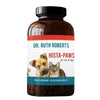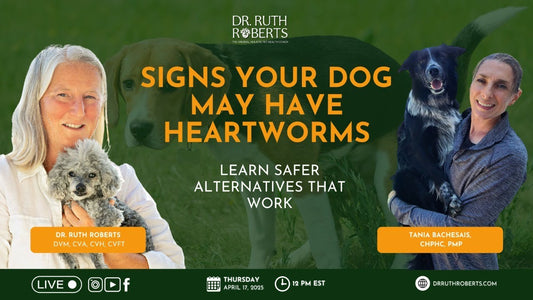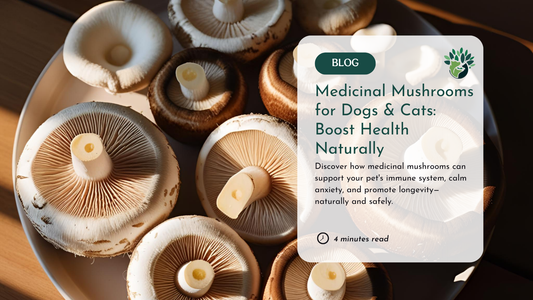Wondering if Your Dog Might Have Heartworms? Maybe they’ve been coughing, acting tired, or just not themselves lately. You might be asking:
-
"What are the early signs of heartworm?"
-
"Do I really need to give prevention meds year-round?"
-
"Is there a natural way to protect my dog?"
You're in the right place. In this post, you’ll get clear answers, safer options, and real-world guidance from holistic pet health experts.
Prefer to watch and learn? Scroll down for the full video or keep reading to explore gentle, effective strategies for parasite prevention.
What Are the Early Signs of Heartworm in Dogs?
How can I tell if my dog has heartworms? Recognizing the early signs of heartworm in dogs is key to catching the disease before it causes long-term damage. Since heartworm develops slowly, symptoms may be subtle at first and are often mistaken for fatigue, aging, or mild respiratory issues.
Here are the most common heartworms symptoms in dogs to watch for:
-
Persistent or mild cough
-
Fatigue after moderate activity
-
Decreased appetite
-
Weight loss
-
Lethargy
-
Swollen belly (in advanced stages)
These early signs of heartworm in dogs often appear gradually and may vary depending on your dog’s size, activity level, and overall health. Some dogs may simply seem “off,” while others could develop a soft cough or lose interest in play and exercise.
Example: If your dog used to love long walks or fetch and now tires quickly, lags behind, or coughs after moderate activity, it may be time to test for heartworm.
How Do Dogs Get Heartworm and When Is Prevention Needed?
Can my dog get heartworm from one mosquito bite? Yes. It only takes one bite from an infected mosquito. But it takes about 10–14 days of temps above 57°F for that mosquito to become infectious. In warm climates like Florida, prevention may be needed 11 months a year. In cooler areas like the Midwest, you may only need protection June through November.
🌡️ Check local temperature patterns and heartworm incidence maps to decide when to start and pause protection. If you're unsure, it's safer to err on the side of caution—especially if you live near water, wooded areas, or anywhere mosquitoes like to hang out. Also, indoor dogs aren’t immune—mosquitoes can and do get inside homes, especially at dawn and dusk. So lifestyle matters, but it doesn’t eliminate the risk.
Many pet parents overlook the early signs of heartworm in dogs because they can resemble common issues like allergies or aging. But even mild symptoms, such as a lingering cough or lower stamina during playtime, can signal a deeper issue. Recognizing these heartworms symptoms in dogs early gives you a better chance at successful treatment and minimizes long-term damage to your dog’s organs.
Do Heartworm Meds Stay in My Dog’s System All Month?
How do heartworm medications work? Most heartworm preventatives don’t stay in the body long. They work by killing larvae from the past 30–45 days, not future bites. That’s why timing is everything. If you miss a dose, your dog may be unprotected even if you give it later.
It’s important to understand that even though these medications are given monthly, they don't create a long-term barrier against infection. They target heartworm larvae from previous weeks, not future exposure. So if your dog is bitten right after taking the med, they’re still at risk. This knowledge helps explain why heartworms symptoms in dogs can appear even in pets on conventional preventatives.
What Are Natural Alternatives to Heartworm Medication?
Natural alternatives focus on boosting your dog’s immune system and repelling mosquitoes rather than killing larvae after infection. This shift in strategy may reduce toxic buildup and align better with a holistic lifestyle. These natural methods also help prevent other parasites, offering broader protection beyond just heartworms symptoms in dogs.
Here’s a holistic plan that works:
-
Feed a fresh, species-appropriate diet (no kibble)
-
Use mosquito-repelling essential oil sprays (Wondercide, Cedarcide)
-
Give HWF Clean Heart every other week during risk season
-
Test for heartworm every 6 months
-
Support detox with liver herbs like milk thistle if needed
These are the same steps our certified Holistic Pet Health Coaches use in real life.
How Can I Detox My Dog After Using Heartworm or Flea Meds?
What helps detox a dog after medication? Give milk thistle daily for 7 days after administering meds. It supports liver function and helps your dog process and eliminate toxins.
Bonus tip: Separate supplements from meals if your pet is picky. It prevents them from associating food with odd flavors.
Liver detox isn’t just for after heartworm meds—it’s a helpful support for dogs exposed to environmental toxins, flea preventatives, or poor-quality food. If your dog has recently shown early signs of heartworm in dogs, a detox protocol may help ease the burden on their system while you explore your next steps with your vet.
Are Common Flea and Tick Medications Safe?
Are flea and tick meds like Simparica Trio safe for dogs? Many contain neurotoxins and are linked to seizures, tremors, and liver stress. Dogs with the MDR1 gene mutation are especially at risk.
Stick to single-ingredient preventatives and avoid products labeled "Plus," "Trio," or those with tick protection unless absolutely necessary.
Many pet owners are surprised to learn that products approved for flea and tick prevention can have long-term impacts on their pet’s nervous system. If your dog has ever had a reaction to these meds or you’re seeing unexpected symptoms, it’s worth reconsidering your approach—especially if heartworms symptoms in dogs are already a concern.
What’s the Best Natural Way to Help Keep Fleas and Ticks Away from Dogs?
Use a layered, non-toxic approach:
-
Spray essential oil repellents daily (Wondercide, Kin+Kind)
-
Add garlic to food in safe doses
-
Use flea-repelling collars and tags
-
Spread diatomaceous earth or cedar chips in the yard
-
Apply nematodes to control larvae naturally
-
Vacuum frequently and wash bedding
Supporting your dog’s natural defenses against parasites means working with their biology instead of relying on chemical solutions. Many essential oils and herbal blends are effective when used consistently and correctly. This approach not only helps keep pests at bay but may also reduce stress on your dog’s immune system—making them less vulnerable to early signs of heartworm in dogs.
Can Gut Health Help Protect Dogs from Parasites?
Absolutely. A well-balanced gut supports immune function, making your dog less susceptible to fleas, ticks, and even heartworms.
🔧 Try a wellness scan like Glacier Peak's Intolerance Test to uncover hidden sensitivities that could weaken your dog's natural defenses.
Gut health is your dog’s first line of defense against many types of infections, including heartworms. A healthy microbiome helps regulate the immune system, manage inflammation, and support detox pathways. Dogs with strong gut health may be less likely to develop severe heartworms symptoms in dogs, making probiotics and fresh diets valuable tools for long-term wellness.
Final Thoughts and Natural Next Steps
Final Thoughts and Natural Next Steps
If you're searching for a safer, more natural way to support your dog’s health without relying on harsh chemicals, you're not alone—and you're not out of options. By recognizing the early signs of heartworm in dogs and making informed choices, you’re already taking a big step in the right direction.
✨ Need help getting started?
Explore our Vaccine & Heartworm Detox Protocol, designed to gently support your dog’s immune system, liver health, and natural parasite defense.
💬 Have questions about your dog’s symptoms or current regimen?
Schedule a personalized strategy session with a certified Holistic Pet Health Coach and get expert guidance tailored to your pet’s unique needs.
📚 Want to keep learning?
Browse our blog for more trusted tips on natural care, gut health, and chemical-free solutions.
Because protecting your dog shouldn’t come at the cost of long-term wellness. Let’s do better—naturally.















